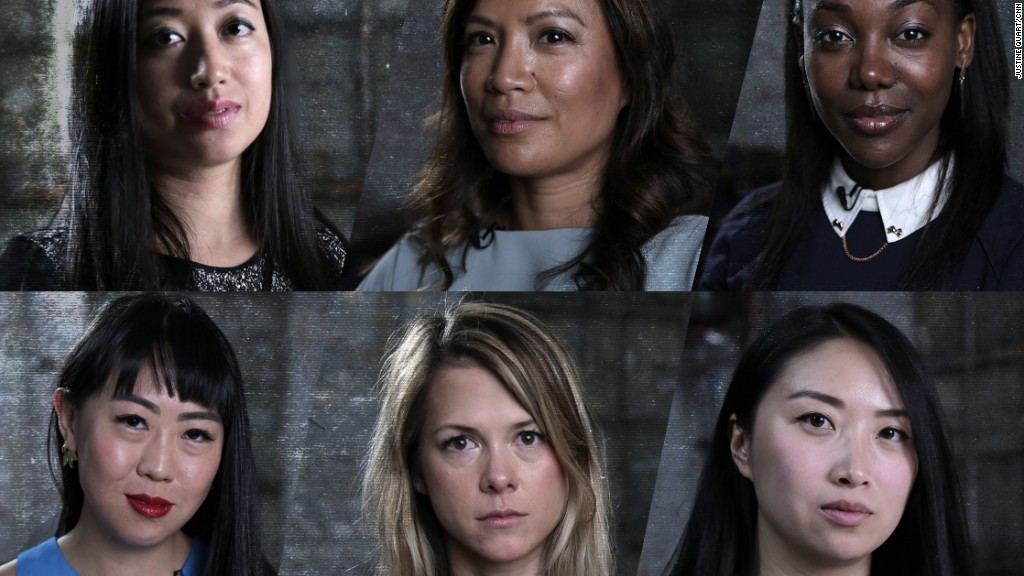
It was an unoriginal argument: Women aren't biologically fit to succeed in tech.
Over the weekend, a 3,300-word manifesto written by one of Google's male engineers was leaked to the press. In the memo, the rank-and-file engineer mused that women aren't suited for tech jobs for "biological" reasons. Men have "higher drive for status," and women have higher rates of anxiety disorders -- making for "lower numbers of women in high stress jobs."
Google (GOOG) quickly condemned the document's assertions. And on Monday, CEO Sundar Pichai emailed the company's staff blasted portions of the memo for "advancing harmful gender stereotypes" in the workplace. "To suggest a group of our colleagues have traits that make them less biologically suited to that work is offensive and not OK," Pichai wrote.
The memo has generated widespread outrage.
In fact, in terms of abilities, attitudes and actions, the differences between the sexes are scarce and minimal, Wharton professor of management and psychology Adam Grant pointed out on Monday.
Sarah Allen, a senior technical leader at Google, told CNN Tech that the memo "distracts everybody from the real issues. It's really frustrating to have to respond to an ill-thought out series of arguments."
Related: Google CEO slams anti-diversity memo as 'offensive'
Allen said she was speaking in an individual capacity, not as a representative of the company. She joined Google more than a year ago and is a member of one of its diversity teams, but she's been working as an engineer and manager in the industry for more than two decades.
Allen, who publicly commented on the memo on her blog, said it illustrated conscious bias.
It "undermines the people who you are saying are different. There is no evidence that we even understand what makes someone a good software developer. It is not linked to math, it's not linked to good education," she told CNN Tech. "I hope he did not mean to imply that his female peers are neurotic. However, that is a message that is underlying it ... It was not thoughtful about the impact it would have on his colleagues."
Lack of women and minority employees continues to be a deep-rooted and painful problem in tech.
Related: Google's open culture tested by engineer's anti-diversity memo
Allegations of sexism and harassment at Uber opened a flood of conversations around Silicon Valley's sexist culture. Despite publishing diversity reports and expressing a desire to increase minority hires, companies haven't shown much measurable improvement in workplace demographics over the last few years.
Turnover in the tech industry caused by the mistreatment of employees costs companies $16 billion a year in replacement costs, according to a recent study from the Kapor Center. The study also found that women "experienced and observed" much more unfair treatment than men.
Allen, who said her personal experience working at Google has been a good one, said the industry needs to focus on "addressing actual toxic work environments and ensuring that people treat their colleagues with respect. This work is creative work, you cannot do creative work in a climate of fear."
Related: Facebook's minority workforce gains are "still disappointing"
It isn't that women aren't cut out to be engineers.
A grassroots attempt to shatter the stereotypes of what an engineer "looks like" went viral in 2015. That same year, a documentary, "CODE: Debugging the Gender Gap," premiered at the Tribeca Film Festival. It highlighted women who played integral roles in computer science history, like Ada Lovelace, considered to be the first computer programmer, and Grace Hopper, a U.S. Navy admiral and programming pioneer. The film aimed to create awareness of what's really behind tech's current gender and diversity issues.
Robin Hauser, the director of "CODE," concluded that tech's gender gap is caused by a mix of stereotypes, startup culture, dearth of role models, pervasiveness of sexism, and inadequate educational pipelines.
Hauser told CNN Tech on Monday that the memo making the rounds now is "totally missing the point."
Related: Sexual harassment in tech: Women reveal their stories
"The part that's most offensive to me is the assumption that women don't seek leadership roles, don't want leadership roles, and don't have the drive for leadership roles," Hauser said. At Google, women hold just 25% of leadership roles, according to Google's latest diversity report.
Lea Coligado, 23, is a software engineer at Google. She said it was difficult to read the manifesto, which purported to be based on science and biology but lacked citations to any evidence or research. She said that her team is supportive and has about an equal number of men and women. But she said the memo was a reminder that it's not this way for everyone.
Prior to joining Google, Coligado said she experienced a lot of what others had warned her about in the tech industry, including sexual harassment. In 2014, she started a blog while an undergraduate at Stanford University called "Women in Silicon Valley" to celebrate women who've stayed in tech "despite the macro and micro aggressions." She continues to work on the blog, even recruiting a team of three other Googlers to help with it. They post twice a month. "The point is to show their resilience."

